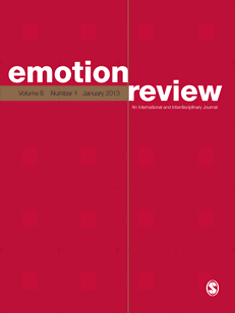
COGNITION & EMOTION
Scope & Guideline
Exploring the Nexus of Thought and Feeling
Introduction
Aims and Scopes
- Interdisciplinary Research on Emotion and Cognition:
The journal emphasizes research that integrates cognitive psychology, neuroscience, and emotional studies, providing a comprehensive understanding of how emotions influence cognitive processes and vice versa. - Empirical Studies on Emotion Regulation:
A significant focus is on understanding the mechanisms behind emotion regulation strategies and their effectiveness in various settings, including clinical and everyday environments. - Dynamic Emotional Processes:
Research often explores the temporal dynamics of emotional experiences, including how emotions evolve over time and their impact on decision-making, memory, and social interactions. - Cultural and Social Contexts of Emotion:
The journal also highlights how cultural differences and social contexts shape emotional experiences and cognitive responses, contributing to the understanding of emotions in diverse populations. - Applied Emotional Research:
There is a consistent interest in applying findings to real-world issues, such as mental health, social behavior, and educational outcomes, enhancing the practical relevance of theoretical insights.
Trending and Emerging
- Emotion Regulation Mechanisms:
There is an increasing focus on understanding the mechanisms underlying emotion regulation, including how cognitive strategies can be employed to manage emotional responses in various contexts. - Impact of Technology on Emotional Processing:
Research examining the effects of technology, such as social media and virtual communication, on emotional experiences and cognition is gaining prominence, reflecting the digital age's influence on human interactions. - Interpersonal Dynamics of Emotion:
Emerging studies explore how emotions are regulated in social contexts, including interpersonal emotion regulation and the effects of emotional expressions on social relationships. - Integrative Approaches to Emotion and Cognition:
A trend towards interdisciplinary research that integrates insights from psychology, neuroscience, and behavioral science is becoming more prevalent, allowing for a holistic understanding of emotional phenomena. - Cultural Influences on Emotion and Cognition:
Research is increasingly addressing how cultural factors shape emotional experiences and cognitive processes, emphasizing the need for context-sensitive approaches in psychological research.
Declining or Waning
- Static Emotion Theories:
Research that emphasizes static or unidimensional theories of emotion is becoming less frequent, as newer studies favor more dynamic, multidimensional approaches that account for the complexity of emotional experiences. - Basic Emotion Models:
The exploration of basic emotions (e.g., happiness, sadness) without considering contextual or social influences is waning, as the field moves towards more nuanced understandings that incorporate contextual factors. - Traditional Cognitive Processes in Isolation:
Studies focusing exclusively on cognitive processes without considering their interplay with emotional experiences are appearing less frequently, indicating a shift towards more integrative research methodologies. - Overemphasis on Negative Emotions:
Research centered primarily on negative emotions (e.g., anxiety, depression) is becoming less prevalent, with a growing interest in the role of positive emotions and emotional complexity in psychological well-being. - Limited Focus on Emotion Measurement:
There is a decrease in studies that utilize traditional, self-report measures of emotion, as more innovative approaches (e.g., physiological measures, ecological momentary assessment) gain traction.
Similar Journals

COGNITIVE THERAPY AND RESEARCH
Bridging Theory and Practice in Cognitive Therapy.Cognitive Therapy and Research is a prestigious journal dedicated to advancing the field of cognitive therapy and its intersections with research in psychology. Published by Springer/Plenum Publishers, this journal has established a significant impact, reflected in its impressive Q1 rankings in both Clinical Psychology and Experimental and Cognitive Psychology, as well as its placement within the 80th percentile of Scopus rankings for Experimental and Cognitive Psychology. With a history spanning from 1977 to 2024, Cognitive Therapy and Research addresses crucial advancements and findings in cognitive therapy, providing a vital platform for researchers, professionals, and students alike. While the journal is not currently open access, it remains an essential resource for those seeking to deepen their understanding of cognitive processes and therapeutic techniques. Situated in the vibrant academic landscape of the United States, the journal reflects a commitment to high-quality research that influences practice and theoretical frameworks within clinical psychology.

Emotion Review
Innovating Perspectives on Emotional ProcessesEmotion Review, published by SAGE Publications Inc, is a leading international journal that focuses on the multidisciplinary examination of emotional processes across various fields. Launched in 2009 and maintaining a strong presence in the UK, this journal has rapidly ascended to be classified in the Q1 quartile across several categories, including Arts and Humanities (miscellaneous), Experimental and Cognitive Psychology, and Social Psychology. With its outstanding Scopus rankings—evident from its 93rd percentile in Arts and Humanities and 88th percentile in Psychological disciplines—Emotion Review plays a crucial role in advancing the understanding of emotional phenomena, offering a platform for innovative research and theoretical developments. While this journal does not provide open access options, it remains a vital resource for researchers, professionals, and students eager to explore the complexities of emotions and their impact on human behavior, making it an essential addition to any academic library.

Journal of Rational-Emotive and Cognitive-Behavior Therapy
Advancing the Science of Emotion and Thought.Journal of Rational-Emotive and Cognitive-Behavior Therapy, published by Springer, stands as a significant interdisciplinary forum in the field of clinical psychology and experimental and cognitive psychology. With a history spanning from 1983 to 2024, this journal is dedicated to advancing research and practice encapsulating the principles of rational-emotive therapy and cognitive-behavioral approaches. Acknowledged for its impactful contributions, it holds an impressive Q2 ranking in Clinical Psychology and a Q3 ranking in Experimental and Cognitive Psychology as of 2023. The journal serves an essential role in disseminating evidence-based findings that cater to researchers, professionals, and students alike, fostering a deeper understanding of cognitive processes and emotional regulation. We invite you to explore the latest research and case studies, which contribute to the therapeutic landscape, and deepen your knowledge in this evolving field.

CANADIAN JOURNAL OF EXPERIMENTAL PSYCHOLOGY-REVUE CANADIENNE DE PSYCHOLOGIE EXPERIMENTALE
Unveiling the Science of the Human MindCanadian Journal of Experimental Psychology / Revue canadienne de psychologie expérimentale (ISSN 1196-1961, E-ISSN 1878-7290), published by the Canadian Psychological Association, serves as a vital resource in the fields of Experimental and Cognitive Psychology and general psychological research. With a respectable impact factor that places it in the Q3 category for both Experimental Psychology and miscellaneous Medicine (2023), this journal offers a platform for innovative research that furthers our understanding of psychological processes. Spanning years from 1993 to 2024, it connects researchers, professionals, and students to contemporary findings and methodologies, fostering a collaborative environment for the advancement of psychological science. Though it does not currently offer Open Access, the journal's commitment to quality and relevance in psychological research continues to make it an important part of the academic landscape, supporting the dissemination of knowledge within a global community.

Cognitive Neuropsychiatry
Innovating Understanding: Unraveling Cognitive Processes in PsychiatryCognitive Neuropsychiatry is a distinguished academic journal published by Routledge Journals, Taylor & Francis Ltd, dedicated to the intersection of cognitive neuroscience and psychiatry. With a strong commitment to advancing knowledge in these rapidly evolving fields, this journal provides a platform for high-quality, peer-reviewed research that explores cognitive processes underlying psychiatric disorders. Aiming to bridge gaps between neuroscience and clinical practice, it serves as an essential resource for researchers, professionals, and students alike. As evidenced by its performance metrics, the journal ranks in the Q2 quartile for Psychiatry and Mental Health, and Q3 for Cognitive Neuroscience, showcasing its relevance and growing impact, particularly among a competitive audience. While it does not currently offer open access options, Cognitive Neuropsychiatry remains a vital outlet for disseminating impactful findings, offering insights that shape contemporary psychiatric understanding and interventions.

Cognitive Neuroscience
Advancing Understanding of Mind and BrainCognitive Neuroscience is a pivotal journal in the ever-evolving field of cognitive neuroscience, published by Routledge Journals, Taylor & Francis Ltd, in the United Kingdom. Since its inception in 2010, this journal has dedicated itself to publishing innovative research that explores the intricate relationships between neural mechanisms and cognitive processes. With an increasing focus on interdisciplinary studies, it addresses critical issues from both theoretical and empirical perspectives. Although it currently holds a Q3 ranking in the Cognitive Neuroscience category, it has made significant strides in its Scopus ranking, now positioned at #62 out of 115, reflecting its growing impact on the academic community. Researchers and professionals will find the journal an invaluable resource for staying updated on the latest findings and methodologies in the field. While the journal operates under a traditional access model, it ensures high visibility and dissemination of crucial research that shapes our understanding of the brain's role in cognition. As it continues to evolve through to 2024, Cognitive Neuroscience remains committed to fostering collaboration and inspiring future innovations within the discipline.

Social Cognitive and Affective Neuroscience
Innovating the Study of Brain and BehaviorSocial Cognitive and Affective Neuroscience, published by Oxford University Press, is a leading academic journal in the fields of cognitive neuroscience and experimental cognitive psychology. With an impact factor placing it in the Q1 category across three disciplines, including medicine, this journal stands at the forefront of research, promoting innovative studies that explore the intricate relationship between social processes and neural mechanisms. Since becoming Open Access in 2017, it has enhanced accessibility for researchers worldwide, facilitating the dissemination and discussion of groundbreaking findings. The journal, which has evolved significantly since its inception in 2006, is ranked among the top 10 in experimental and cognitive psychology and is highly regarded within the cognitive neuroscience community, making it a crucial resource for professionals, academics, and students eager to advance their understanding of the neural substrates underlying social cognition and emotion. The editorial board invites submissions that contribute to the interdisciplinary dialogue surrounding these critical areas of research, ensuring that the journal remains a vital platform for scholarly exchange.

QUARTERLY JOURNAL OF EXPERIMENTAL PSYCHOLOGY
Connecting Scholars, Ideas, and InnovationsQuarterly Journal of Experimental Psychology, published by SAGE Publications Ltd, is a leading peer-reviewed journal that serves as a vital resource in the fields of experimental and cognitive psychology, neuropsychology, and medicine. With an impactful contribution to psychological research, the journal is recognized for its rigorous methodology and empirical studies, holding a notable ranking among its peers—finding itself in the Q2 quartile across several categories. With its origin tracing back to 2006, Quarterly Journal of Experimental Psychology significantly influences the academic discourse until its latest published findings in 2024. Catering to a diverse audience of researchers, professionals, and students, this journal provides Open Access options, enhancing the reach and accessibility of cutting-edge psychological research. By focusing on innovative approaches and findings, it aims to bridge theoretical understanding with practical application, hence fostering advancement in multiple related disciplines. For those committed to understanding the complexities of human behavior and cognitive processes, this journal remains an essential reference point.

EMOTION
Pioneering Research in Emotional ProcessesEMOTION is a leading peer-reviewed journal published by the American Psychological Association, focusing on the intricate dynamics of human emotions. With its ISSN 1528-3542 and E-ISSN 1931-1516, this esteemed journal has established itself as a pivotal resource in the fields of Psychology and Medicine, proudly ranking in the top quartile (Q1) according to the latest metrics and scoring a remarkable position as #22 out of 216 in the Scopus General Psychology category, placing it in the 90th percentile of its field as of 2023. Spanning from its inception in 2001 to 2024, EMOTION publishes cutting-edge research, theoretical articles, and empirical studies that advance our understanding of emotional processes and their implications for psychological well-being. While EMOTION is not an open-access journal, it remains a crucial platform for researchers, professionals, and students seeking to engage with and contribute to the burgeoning field of emotional psychology.

Journal of Cultural Cognitive Science
Cultivating Knowledge at the Intersection of Culture and CognitionThe Journal of Cultural Cognitive Science, published by SpringerNature, is an esteemed forum for researchers and scholars dedicated to exploring the intersection of culture, cognition, and language. With its ISSN 2520-100X and E-ISSN 2520-1018, this journal has made significant strides since its inception in 2017, covering a wide array of topics pertinent to Experimental and Cognitive Psychology and Linguistics and Language. Notably, it has achieved remarkable recognition, ranking in the Q3 category for Experimental and Cognitive Psychology and Q1 for Linguistics and Language in 2023. Its Scopus ranks further illustrate its impact, with the journal positioned at the 89th percentile in Social Sciences - Linguistics and Language and 47th percentile in Psychology. Despite its ongoing journey, it continues to foster open dialogue and innovation among professionals, researchers, and students, providing valuable insights and advancing knowledge in the field.